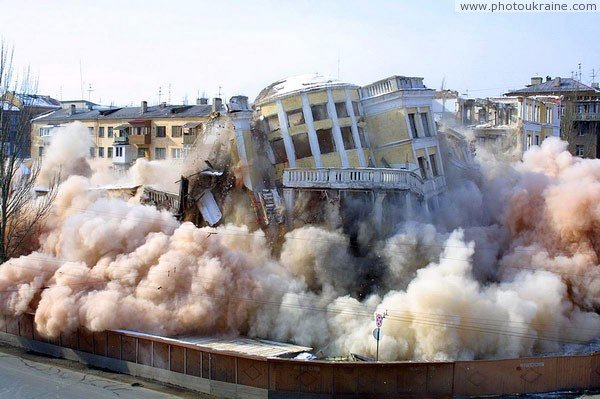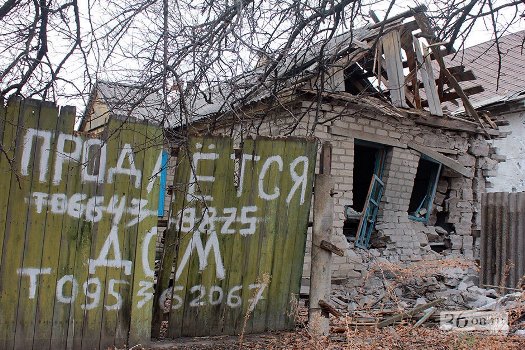In spite of all attempts and of Russian President Vladimir Putin’s promises to stop it, the war in southeastern Ukraine keeps going. Both Russian and Ukrainian Internet are full of information about life under fire in the South-East.
Donbass (Donets river basin) used to be one of the biggest industrial areas of the former Soviet Union, the home of famous, proud and prosperous coal miners and steel producers – the breadwinners of Ukraine. Now during these years of Ukrainian resistance to Russia hegemony the inhabitants of the area have completely lost their prosperity. Two southeastern Ukrainian cities – Donetsk (population about a million) and Luhansk (almost half a million) for nearly two months this past summer months lived under continuous artillery fire. Residents had to survive for weeks without electricity, telephone service or water. Most were confined to basements. Today nearly every city block bears some evidence of the fighting: buildings burnt or gutted by artillery explosions.


“This house is for sale. Call 095362067”.
Hundreds of thousands of the residents of the area have run away to the peaceful parts of Ukraine, another half a million or more have escaped to Russia.
Life in Donbass has a surreal quality. On one hand it looks like normal activity is going on: some Universities and schools remain in session, some cafés and restaurants are opened. On the other hand old people are not receiving their pensions, most working people are not receiving being paid, the main source of food is humanitarian assistance from Russia, and artillery shells still explode in the streets.
Activist Dr. Elisabeth Glinka, who is engaged in taking wounded and sick children from the area to Russia, wrote this week in the most popular Russian web site Vesti.ru:
“More than 200 old people stay permanently in Donetsk basements, because the areas where they live are bombed daily. Twenty-four seniors, afraid to get out of their hiding places, died of starvation in the past month. Twenty-five to 30 children were wounded this month, their injuries – severe mine blast traumas. All the maternity hospitals are destroyed in Donetsk; women give birth in basements. Also there are no children’s hospitals.”
According to Vitally Leibin’s article in the popular Russian web site Expert.ru the residents of the self-proclaimed Donetsk and Luhansk Republics are disoriented. They want peace above all, they want normal life under any power, though no one will say it openly. They hate Kiev authorities, but salaries and pensions come or do not come from Kiev.
The inhabitants accept self-proclaimed regional governments as military administrators and as distributors of humanitarian help. These governments call for volunteers to help fighting; they arrest saboteurs and those who help them. Nevertheless locals understand, that in order to function, one still has to use the Ukrainian government structures and Ukrainian financial system – no others exists.
People in a bomb shelter in Donetsk asked Russian journalist Vitally Leibin many questions. Here are some of them:
“- The governments of Donetsk and Luhansk republics seem to be local, but there are many Russians in them. And if these governments are not Russian governments, what is the meaning of them?
– What are they thinking in Moscow about our situation? We’re sitting here in the basement completely without information. Why did Putin not take our territories into Russia?
– Let it even be the way it was before. It was bad, but people somehow lived, took loans, had some kind of life; now all is burnt. Everything is gone.
– Well, let it be at least some life. Now we are deprived of everything. Even Yanukovych was better than Poroshenko, whose army is shooting us.
– What does this all have to do with Poroshenko or Yanukovych? We just do not have a ruler who can pulll everything together. We don’t understand what is happening.”
A correspondent of a Ukrainian popular web site Censor.net.ua, Vasily Rybnikov, gives a sarcastic review of the situation in his article, which was reposted by many and even on a local Donetsk web site:
“Some six months ago, the inhabitants of Donbass ran through the squares, trashing and robbing supermarkets in joyful anticipation of Putin’s coming, feeling like one of the major geopolitical players on the world map, and reveling in the national unity of the proletarian masses of Ukrainian southeast…
“There was an unprecedented rise of spirit, the whole world laid at the feet of the aroused Donbass, which was in want of vodka, executions by firing squads and in need of looting of all liqueur stores or at least the particular bar, which yesterday refused to pour booze on credit. And even more Donbass anticipated becoming a part of Russia, because, as we all know, the people of Russia do nothing but drink vodka from morning to night, and their economical level of life is high, as one can see in popular the Russian TV series about ‘good fellows’.
This week, residents of Donbass suddenly discovered that life is passing by, and the smartest of them even began to suspect that now no one is going to hear them…”

